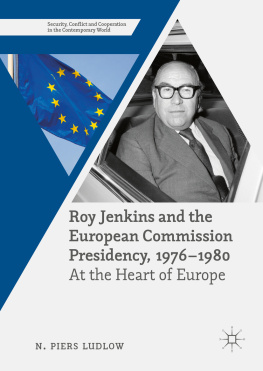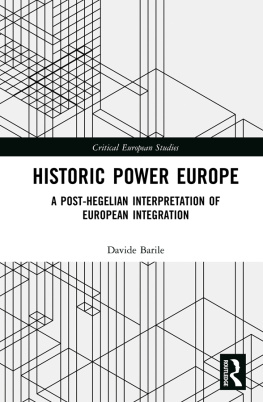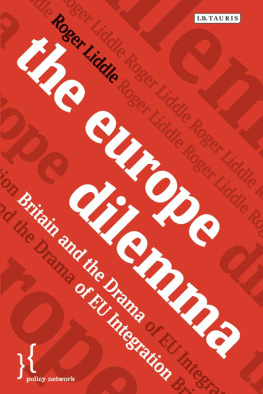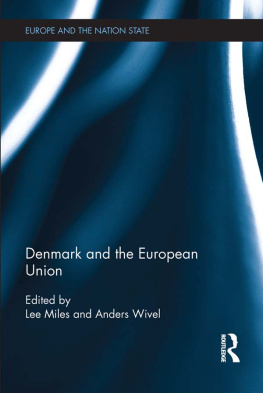1. Introduction
Roy Jenkins was a remarkable politician who assumed the post of Commission president at a crucial time. Between 1977 and 1980 he found himself at the heart of a European Community that was in a troubled state, its institutions and policies struggling to cope with the global economic crisis underway since 1973. Jenkins own country, meanwhile, still appeared unable to come to terms with its European choice, uncertain whether its recently attained membership of the European Community was a help, a hindrance, or an irrelevance at a moment when the UKs economic performance and political fortunes reached a post-war nadir. And Jenkins himself was at a personal moment of flux, his earlier rapid ascent towards the very summit of British politics interrupted by electoral misfortune and the changing mood of the Labour Party, the attainability of both his European and domestic ambitions undermined by the increasingly polarised nature of British domestic politics during the 1970s.
The aim of this book is to paint a closely observed portrait of the Jenkins presidency. By so doing it will provide a detailed study of a job, the Commission presidencya job which is often referred to, yet little understood. A well-documented examination of how one talented and energetic politician sought to impose himself on the position, and the degree to which his ambitions succeeded or failed, will reveal much about the nature of the post and, more broadly, the strengths and limitations of the role that the European Commission is called upon to play. Far too political to be just a technocrat, but lacking the electoral mandate or the clout and influence that comes from occupying a leadership role within one of the larger EC member states, Jenkins as Commission president sought to engage with the European leaders of the era and win them over to his position on a wide range of European issues. His successes in doing so say much about the potential importance of the role; his even more numerous failures, by contrast, speak volumes about its inherent limitations. And a close engagement with how Jenkins operated as president, what he sought to do, what he achieved, and how he fell short, will also act as valuable foil to the much better studied Commission presidency of Jacques Delors. Jenkins successor-but-one dominates current scholarly writing about the Commissions top job. An in-depth investigation of how an earlier and somewhat less successful president fared in the same post will therefore enrich our understanding of the position, and throw into sharper relief some of the methods, approaches, and innovations that helped Delors become the most powerful Commission president to date.
The book will also be a study of a man, or at least the very human story of one mans engagement, both frustrating and rewarding, with a cause and a process of which he had become a prominent advocate. Jenkins career had become closely associated with the cause of European integration and the idea of Britains participation in that process. There was therefore logic to Jenkins decision to withdraw from British politics following the frustration of his ambitions to lead the Labour Party, and to concentrate instead on playing an active role in the integration process. How he faredand how he regarded his 4 years in Brusselsreveals much not just about his post but also about his personality, his capabilities, and his limitations. This book will also therefore be a biographical contribution to a short, but interesting, important, and less well studied, chapter of Jenkins life.
It will be a study too of a brief moment when it seemed that Britains pro-Europeans, of whom Jenkins was one of the most prominent, might finally be able to exercise a degree of that leadership role which much of the UK political elite had assumed that they would automatically inherit upon joining the EEC, but which had proved stubbornly elusive for most of the early years of membership. The waning of such hopes, and Jenkins painful discovery of how little able he was to influence the evolution of the UK debate about the EEC from his Brussels vantage point, will be one of the sub-plots that run throughout the chapters that follow.
Lastly, the book will provide a snapshot of a vital period, both in Western Europe and in the world more generally. The relevance and value of European integration itself was suddenly unsure. Most of the founding members of the EEC had viewed their participation in the process of ever-closer cooperation with their neighbours as part of the formula that had helped underpin their almost ceaseless economic growth. Now that that growth had come to an end, however, what did this say about the value of integration? Was it part of the solution needed to rediscover economic advance? And if so, how should it change and what objectives should it aim at? Or was it instead another feature of the previous economic template that needed to be jettisoned in light of the economic downturn?
Also particularly challenging for Western Europe was its vulnerability to another of the salient features of the period, namely the sudden rise in oil prices and the realisation of how dependent was Western prosperity on energy and other resources flowing towards Europe, North America, and Japan from the countries of the developing world. Most of these problems and trends left some trace on the dossiers that crossed the Commission presidents desk and in the conversations that Jenkins had with most of the Western leaders of his time. A detailed study of what he said and how he regarded some of these issues can thus offer a valuable, if tightly focused, view of a rich and eventful period of recent history.
The pages that follow will thus have four main purposes. First and foremost they will be a study of the role that Jenkins filled, a portrayal of a presidency that will shed light not just on what Jenkins was and was not able to do, but also permit a better understanding of how his predecessors and successors have fared. Second, the book will offer an in-depth biographical contribution to a period in Jenkins life that has been less well captured by most of the existing literature. Third, it will add a further chapter to the troubled tale of Britains difficult relationship with the European Community/Union. And fourth, the study will offer one individual, but distinctive, vantage point from which to better understand the challenges and complexities facing both Europe and the wider Western world in the latter half of the 1970s.
A Unique Source Base
This close-up portrayal of Roy Jenkins 4 years as Commission president is made possible by a very full and highly distinctive source base. Indeed, this book differs from most other articles or books that I have written in as much as the source base led to the project, rather than the project defining the source base.
The roots of my decision to write a study of the Jenkins presidency lie in my earlier participation in a team of historians assembled to write a history of the European Commission during the period from 1973 to 1986. In order to produce this volume, those taking part in the project were granted extensive access to the Commission archives for the years in question. This was, for many of us, one of the key attractions of taking part. But we were also very strongly encouraged by the European Commission itself which was financing the project, and by Michel Dumoulin, who had assembled the consortium that was to write the volume, to interview over 200 of those who had worked in Brussels during the 1970s and the first half of the 1980s. Like the first volume of Commission history covering the 195872 period published in 2007, this analysis of a second tranche of the Commissions past was to rest on oral sources and eyewitness testimonies as much as on archival documents.











